Sight N' Steps Blog
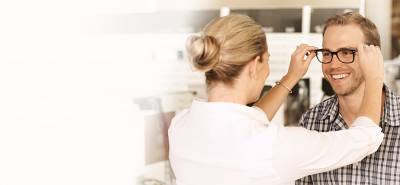
“Hi, My name is Lori, Welcome To Sight N’ Steps!!” Greeted a chirpy little personality with a big smile as I walked into Sight N’ Steps’ ambient Ajax facility to attend my Optometrist Appointment. “Would you like a bottle of water?” offered Lori – The Lead Optician at Sight N’ Steps, as she sat me down in a comfortable blue (Sight N’ Steps’ signature color) couch. She then gave me an iPad to enter my information and went away to get me a bottle of water.
...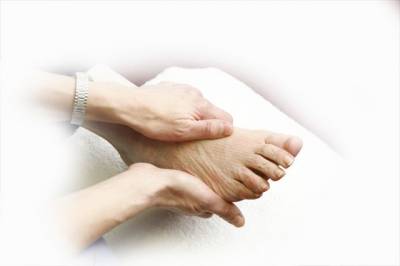
Foot care
Research has shown that people with diabetes who take good care of their feet and protect their feet from injury, are much less likely to develop foot ulcers.
Good foot care includes:
- Looking carefully at your feet each day, including between the toes. If you cannot do this yourself, you should get someone else to do it for you:Looking is particularly important if you have reduced sensation in your feet, as you may not notice anything wrong at first until you look.If you see anything new (such as a cut, bruise, blister, redness or bleeding) and don't know what to do, see your chiropodist.
- Do not try to deal with corns, calluses, verrucas or other foot problems by yourself. They should be treated by a health professional such as a chiropodist. In particular, do not use chemicals or acid plasters to remove corns, etc.
- Use a moisturising oil or cream for dry skin to prevent cracking. However, you should not apply it between the toes as this can cause the skin to become too moist which can lead to an infection developing.
- Look out for athlete's foot (a common minor skin infection). It causes flaky skin and cracks between the toes, which can be sore and can become infected. If you get athlete's foot, it should be treated with an antifungal cream.
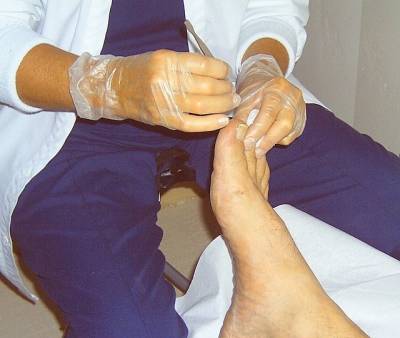
- Cut your nails by following the shape of the end of your toe. But, do not cut down the sides of the nails, or cut them too short, or use anything sharp to clean down the sides of the nails. These things may cause damage or lead the nail to develop an ingrown nail. If you cannot see properly do not try to cut your nails, as you may cut your skin. You should ask someone else to do it.Wash your feet regularly and dry them carefully, especially between the toes.
- Do not walk barefoot, even at home. You might tread on something and damage your skin.Always wear socks with shoes or other footwear. However, don't wear socks that are too tight around the ankle, as they may affect your circulation.
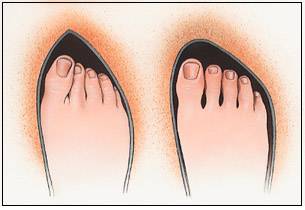
- Shoes, trainers and other footwear should:Fit well to take into account any awkward shapes or deformities (such as bunions).Have broad fronts with plenty of room for the toes.Have low heels to avoid pressure on the toes.Have good laces, buckles or Velcro® fastening to prevent movement and rubbing of feet within the shoes.When you buy shoes, wear the type of socks that you usually wear. Avoid slip-on shoes, shoes with pointed toes, sandals and flip-flops. Break in new shoes gradually.Always feel inside footwear before you put footwear on (to check for stones, rough edges, etc).If your feet are an abnormal shape, or if you have bunions or other foot problems, you may need specially fitted shoes to stop your feet rubbing.
- Tips to avoid foot burns include: checking the bath temperature with your hand before stepping in; do not use hot water bottles, electric blankets or foot spas; do not sit too close to fires.
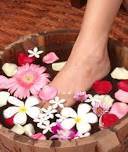
The mechanical properties of foot orthotics help to ensure the correct positioning of the bones in the feet, ankles, and knees. The muscles and ligaments leading up to the hips and holding the leg bones in place are prevented from stretching over time, which can lead to further injury and aggravation.
Foot orthotics can also reduce muscular fatigue and may help to promote more efficient muscle performance. Many biomechanical problems related to the feet are caused by plastic deformation- which occurs when connective tissue is placed under repetitive or constant stress. The connective tissue may slowly stretch over time. Increases in tissue length can cause greater bone instability in the foot and lead to issues such as over-pronation, or fallen arches.
People who are active in sports may find that custom orthotics help to increase endurance, strength and performance abilities. Individuals who are overweight may find that orthotics relieve the additional stress of extra weight off the ligaments in their feet and legs. The use of orthotics can help some people to avoid or prolong having surgery.
...-
 Jonathan Tomines - The Toe Bro says #how to remove an ingrown toenail forever - https://www.youtube.com/watch?v=EWIfZ6wWDyE
Jonathan Tomines - The Toe Bro says #how to remove an ingrown toenail forever - https://www.youtube.com/watch?v=EWIfZ6wWDyE




